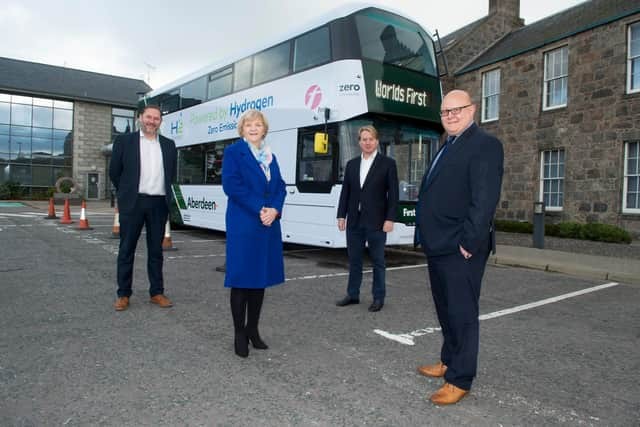World's first hydrogen-powered double decker bus arrives in Aberdeen
Operator First Aberdeen’s passengers are expected to start using the first of the £500,000 buses next month following final testing and driver training over the next few weeks.
The move follows the city pioneering hydrogen buses with a trial of ten single deckers which started in 2015.
Advertisement
Hide AdAdvertisement
Hide AdAberdeen also boasts the UK’s only hydrogen-powered hire cars.


Aberdeen City Council said the latest 15 buses were as efficient as their electric equivalents, with refuelling taking less than 10 minutes and a greater range.
Their only emission is water.
The single decker trial followed the opening of the UK’s first hydrogen production and bus refuelling station in the city in 2015.
The first buses will operate First’s 19 between Peterculter and Tillydrone.
Council co-leader Jenny Laing said: “We are very proud to bring the world’s first hydrogen-powered double-decker buses to Aberdeen as it shows the city continues to be at the forefront of developing green technologies.
“The roll out of the new double decker buses will help to cement Aberdeen’s position as an entrepreneurial and technological leader as the new buses come with even more advanced technology which pushes established hydrogen boundaries and greatly assists us in tackling air pollution in the city.”
Co-leader Douglas Lumsden said: “By leveraging our unique assets and capabilities, we will help lead the world on the rapid shift to a net zero future and support the global energy transition as a climate positive city.”
Jo Bamford, owner and executive chairman of Northern Ireland-based bus builder Wrightbus, which made the buses, said: “We’re immensely proud to be putting the world’s first fleet of hydrogen double deckers onto the streets of Aberdeen.
Advertisement
Hide AdAdvertisement
Hide Ad“They represent the start of what could be a world-leading hydrogen economy in Scotland which will bring with it multi-million pound investments and tens of thousands of jobs.”
First Aberdeen operations director David Phillips said: “We are excited to see the impact these buses will have.”
The £8.3 million project has been partly funded by the European Union’s Joint Initiative for hydrogen Vehicles across Europe (Jive) project for hydrogen bus development, which includes other UK cities including Dundee.
The Scottish Government has provided £3m of the funding, with £2.3m from Aberdeen City Council, £2.3m from the EU and the rest from firms.
The Jive project will see 139 new zero-emission fuel cell buses and refuelling stations established in five countries.
A second Jive scheme is due to increase the total to nearly 300 fuel cell buses in 22 cities within the next few years.
The Scottish Government’s Transport Scotland agency is backing trials of both electric and hydrogen buses while the technology continues to be developed.
However, because of the high cost of hydrogen production, the use of surplus energy generated by renewable sources such as wind farms is seen as a potential game changer to make the gas’s use to power transport more viable.
A message from the Editor:
Thank you for reading this story on our website.
While I have your attention, I also have an important request to make of you.
With the coronavirus lockdown having a major impact on many of our advertisers - and consequently the revenue we receive - we are more reliant than ever on you taking out a digital subscription.
Subscribe to scotsman.com and enjoy unlimited access to Scottish news and information online and on our app.
With a digital subscription, you can read more than five articles, see fewer ads, enjoy faster load times, and get access to exclusive newsletters and content.
Visit https://www.scotsman.com/subscriptions now to sign up.
Our journalism costs money and we rely on advertising, print and digital revenues to help to support them.
By supporting us, we are able to support you in providing trusted, fact-checked content for this website.
Joy Yates
Editorial Director
Comments
Want to join the conversation? Please or to comment on this article.